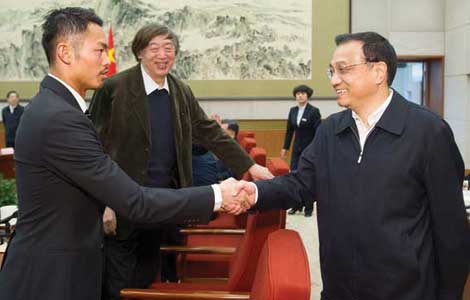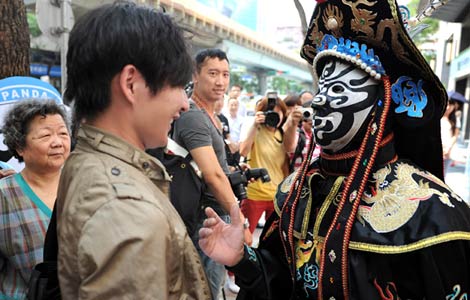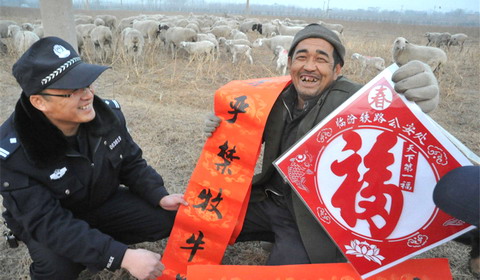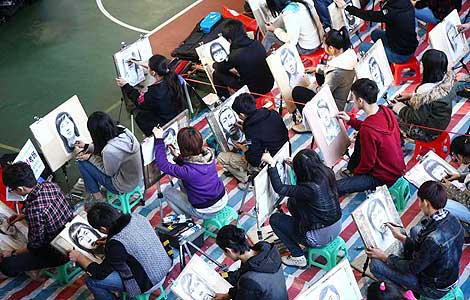White House fine-tunes Asia pivot to 'quench fire'
Updated: 2014-01-20 00:57
By Pu Zhendong (China Daily)
|
||||||||
Washington is dispatching two diplomats to East Asia to fine-tune the US pivot to Asia-Pacific by "quenching the fire" between China and Japan, after recent provocative moves by Tokyo that have further threatened regional stability, observers said.
US Deputy Secretary of State William Burns left Washington on Sunday for South Korea, China and Japan, while Daniel Russel, assistant secretary of state for East Asian and Pacific affairs, begins his East Asian trip on Monday.
Burns and Russel will meet in Beijing on Wednesday for bilateral talks with government officials. Russel will separately lead the Asia-Pacific Consultations and hold other bilateral meetings with his Chinese counterparts during his stay, according to the US State Department.
Experts said that mediating strained ties and encouraging dialogue among Beijing, Seoul and Tokyo are at the top of the diplomats' agendas. Washington's increased intervention is an effort to relieve tensions in Northeast Asia, they said.
"The US has been viewing China as a country of global influence and seeking to coordinate with China on a broad range of topics, including the situation on the Korean Peninsula," said Li Haidong, a researcher of American studies at China Foreign Affairs University.
The two US diplomats will try to promote dialogue between Beijing and Tokyo to demonstrate its "positive presence" in the region, but Japan will not be the only issue talked about.
Jin Canrong, deputy dean at the School of International Studies at Renmin University of China, said Burns and Russel are in the region to "quench the fire" among the Asian neighbors, but strategic confrontation between China and Japan has gone so deep it cannot be simply resolved by diplomatic visits.
"The US will not pick sides in terms of these disputes and therefore the effects of the mission's peacemaking efforts will be limited," Jin said.
Relations between Tokyo and its neighbors have worsened in recent months following the country's policies regarding territorial disputes and Prime Minister Shinzo Abe's visit to the controversial Yasukuni Shrine, which honors 14 Class-A war criminals from World War II.
Li said Beijing's unprecedented anger over Abe's shrine visit, seen in harsh criticism from more than 40 ambassadors, has made Washington reflect on its Japan policy.
"In the past, the US relied on Japan to be a pillar of its rebalancing strategy in the Asia-Pacific without giving enough attention to the country's waking militarism and stubbornness on issues of history," Li said. "Washington had become Tokyo's tool to help meet its own agenda."
Jin said Washington is highly concerned about the development of the China-Japan animosity.
"Opinions about Japan's role in the Asia-Pacific are split in the US," he said. "The military encourages an assertive Japan, but some legislators are skeptical about it."
On Friday, US President Barack Obama signed into law a spending bill that includes a provision on Japan's wartime sexual enslavement of Asian women.
Xinhua contributed to this story.
puzhendong@chinadaily.com.cn

 Winter cultural festival opens in Xinjiang
Winter cultural festival opens in Xinjiang
 Premier vows to help startups
Premier vows to help startups
 Air travel to Taiwan continues to take off
Air travel to Taiwan continues to take off
 Panda cub in Washington makes her public debut
Panda cub in Washington makes her public debut
 Spring Festival preparations across China
Spring Festival preparations across China
 Obama bans spying on leaders of US allies
Obama bans spying on leaders of US allies
 Bunnies on parade to celebrate 60 yrs of Playboy
Bunnies on parade to celebrate 60 yrs of Playboy
 Chipmunk fit to burst as it stuffs peanuts into mouth
Chipmunk fit to burst as it stuffs peanuts into mouth
Most Viewed
Editor's Picks

|

|

|

|

|

|
Today's Top News
Dropping 'no-war' pledge a part of Abe's strategy
Gang busted for illegal gender selection testing
China software to rival Android, iOS
White House fine-tunes Asia pivot to 'quench fire'
Xi writes to Chinese in German
Premier vows to help startups
Will China dominate the world?
Students tested on China knowledge
US Weekly

|

|






